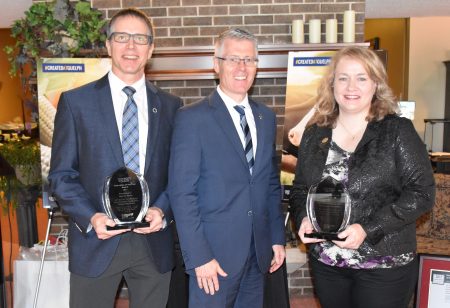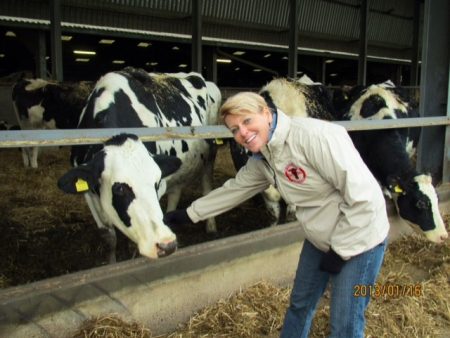Two University of Guelph innovations — sweet corn nanoparticles and genetic testing technology for livestock — have received this year’s Innovation of the Year awards for U of G inventions.
The annual awards from the Office of Research and the Catalyst Centre recognize faculty members for creative strategies or products that make a difference in people’s lives.

Physics professor and Canada Research Chair John Dutcher was selected for his work with nanoparticles, and pathobiology professor Bonnie Mallard was recognized for her immuno-genetic technology at a ceremony in the University Club June 29.
“These U of G discoveries are positively impacting the lives of people, the environment and communities,” said Malcolm Campbell, vice-president (research).
“This research is creating sustainable, well-paying jobs while making a real difference in the health and well-being of Canadians. They are excellent examples of innovations coming directly from University of Guelph research that are fueling inclusive economic growth, with job creation at its heart.”
Synthetic nanoparticles are often toxic and non-biodegradable, leading regulators to create substantial barriers before the technology can be adopted in the marketplace.
Dutcher’s team discovered sweet corn nanoparticles of phytoglycogen, which are non-toxic, biodegradable and water-soluble. The PhytoSpherix technology is now being marketed by the Guelph-based company Mirexus with 18 full-time employees.
“The leading applications are in personal care and this is now the main focus of sales in Mirexus,” said Dutcher.
“The applications in nutrition and biomedicine are perhaps even more promising, but this will take longer.”
Mirexus is building a manufacturing facility in Guelph to be running by 2018.
“Ultimately, the use of our particles in biomedical and pharmaceutical applications may be the most lucrative opportunity,” Dutcher said.
“It’s been rewarding seeing our discovery going from the lab to the marketplace. It was truly a team effort, and I’m very happy to share this award with my co-inventors.”

Mallard’s High Immune Response (HIR) technology has already been recognized this year with a prestigious Governor General’s Award for Innovation.
By improving breeding selection, the tool allows farmers to raise healthier animals requiring less treatment and antibiotic use. High immune responders have about half the disease incidence of their herd mates.
“The healthier the cow, the healthier the environment,” said Mallard from Spain, where she is attending a conference.
“I am very pleased this immuno-genetics approach has worked so well to improve animal health, and now has proven effective in the field.”
The use of the technology by cattle genomics company Semex Alliance led to $18 million in sales in the first two years, and has helped the company grow by 60 per cent in the last three years.
“The award is wonderful news and the whole HIR team is thrilled,” said Mallard.
“It is particularly fun to win both the Governor General’s Award and the Innovation of the Year on Canada’s 150th birthday. HIR provides benefits to the producer, the consumer and the animal, resulting in a healthier and sustainable food chain.”